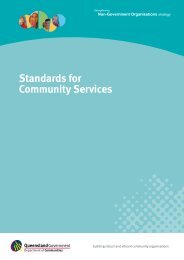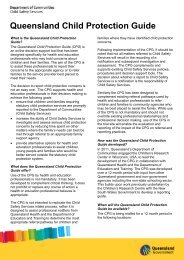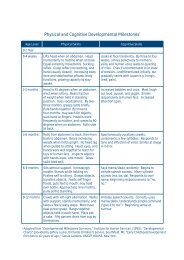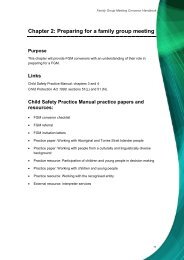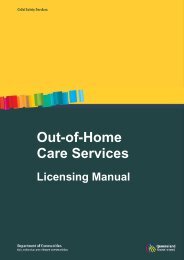Housing and Support Program (HASP): Final Evaluation Report
Housing and Support Program (HASP): Final Evaluation Report
Housing and Support Program (HASP): Final Evaluation Report
You also want an ePaper? Increase the reach of your titles
YUMPU automatically turns print PDFs into web optimized ePapers that Google loves.
Accountability<br />
There was a perception among <strong>Support</strong>s Facilitators<br />
that there needs to be more accountability <strong>and</strong><br />
transparency around the levels of support provided.<br />
<strong>Support</strong>s Facilitators cited situations where support<br />
shifts/hours were not being fi lled <strong>and</strong> were asking<br />
who was overseeing the process:<br />
Say someone gets verifi ed for 30 hours a week,<br />
that’s really nice, but they may not need 30 hours<br />
a week ongoing, but there is no mechanism in place<br />
whereby we really look at that regularly, like how<br />
much support is a person using, are they being over<br />
supported, making them more dependant, <strong>and</strong> are<br />
we entrapping them?<br />
<strong>Support</strong>s Facilitator<br />
There were also concerns around the transfer of clients<br />
between agencies. It was pointed out that under<br />
‘block’ funding it was much more diffi cult for clients<br />
to move from one agency to another. The agency<br />
transferring the client keeps the funding for that client<br />
so that the receiving agency has to have enough<br />
funding capacity to support the new client. As a result,<br />
it can be diffi cult for clients on large packages to move<br />
between agencies.<br />
Care Planning<br />
Care planning is an important component in the<br />
provision of a coordinated approach to the delivery<br />
of services. A number of stakeholders noted that<br />
some clients can have three care plans — a transition<br />
plan, a plan developed by clinical services <strong>and</strong> a plan<br />
developed by the support agency:<br />
We have a situation where some of the clients have<br />
three care plans – I know that sounds unusual <strong>and</strong><br />
it would be better if we had one… <strong>and</strong> all used that<br />
as a reference point. It appears that each provider<br />
prefers to have their own plan<br />
Case Manager<br />
It was suggested by a number of the staff interviewed<br />
that it would be much more effective for each individual<br />
to have a single care plan which is developed with input<br />
from all stakeholders including the client. This care plan<br />
should be used to guide interventions with the client<br />
<strong>and</strong> be reviewed <strong>and</strong> updated on a regular basis —<br />
at least every three months.<br />
Transport costs<br />
Approximately two-thirds of clients indicated that<br />
their support agency/support workers provide them<br />
with transport. The payment of support agencies/<br />
workers for this service does raise some concerns.<br />
In some situations, it was noted that the client pays<br />
the support worker directly for the transport. In others,<br />
support workers transport clients free of charge <strong>and</strong><br />
claim the cost in their annual tax return as a work<br />
related deduction. <strong>Final</strong>ly, some agencies take<br />
funding from the client’s <strong>HASP</strong> package to fund<br />
transport costs. Clarity needs to be provided on the<br />
most appropriate approach for managing transport<br />
costs/reimbursement.<br />
<strong>Housing</strong> <strong>and</strong> <strong>Support</strong> <strong>Program</strong> (<strong>HASP</strong>)<br />
29



